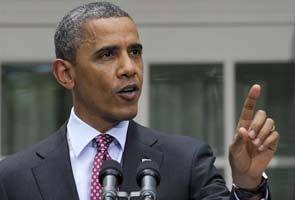
New Delhi, July 16: India has dismissed Barack Obama's statement that the investment climate in India is "deteriorating," suggesting that the US President is "not properly informed" about the country's strong economic fundamentals. And that certain "international lobbies" are attempting such misinformation. Mr Obama's weekend statement has raised the hackles of not just the government, but also opposition parties of every hue.
The US President had said on Sunday, "In too many sectors, such as retail, India limits or prohibits the foreign investment that is necessary to create jobs in both our countries, and which is necessary for India to continue to grow... there appears to be a growing consensus in India that the time may be right for another wave of economic reforms to make India more competitive in the global economy."
Corporate Affairs Minister M Veerappa Moily made a strong rejoinder saying, "Certain international lobbies like Vodafone are spreading this kind of a story and Obama was not properly informed about the things that are happening, particularly when India's economic fundamentals are strong."
In an interview to Press Trust of India, the minister also said that the perception of a deteriorating investment climate in India was not based on economic parameters, but on certain impressions of a few individuals, entrepreneurs and investors. "That is also being removed. Once that perception is removed, I think in 2-3 months, we are back again with a kickstart to pick up the same speed as we had done in the last decade," he added.
The minister was emphatic that there was no crisis in India, whereas the US and other countries had faced crises, "not once but twice in 2008 and 2010". "Not even a single financial institution has collapsed in this country, whereas many such things have collapsed in US and other countries," he said.
In the last one decade, India had registered a vibrant growth rate of 8 to 9.5 per cent, he said, adding "but perhaps for the economic crisis in the US and Europe, the country would have definitely crossed 10 per cent of the GDP."
"That is the potential of India which can recover back immediately by taking some remedial steps," Mr Moily said. He said 55 per cent of the investment in the form of Foreign Institutional Investors (FIIs) and Foreign Direct Investment (FDI) comes from as many as ten countries like Mauritius, Cyprus and Singapore, and only 19 per cent comes from the US and other countries.
"Ultimately Prime Minister Manmohan Singh is going to address all these problems and it is being considered. That's why, again, the investment climate is picking up," he said.
In this, the government's position is backed firmly by the Opposition. The BJP has taken umbrage at Mr Obama saying that India prohibits foreign investment in too many sectors. The party's Yashwant Sinha, a former Finance Minister, said India could not open its markets just because the US President wished it. "If Obama wants FDI in retail and India does not want, then it won't come just because he is demanding it," said Mr Sinha.
Noting that India prohibited foreign investment in too many sectors such as retail, Mr Obama had, on Sunday, cited concerns over the deteriorating investment climate to endorse another "wave" of economic reforms. (Read)
The party's Mukhtar Abbas Naqvi said the US President's remarks were "laughable". "That country is giving us a certificate on investment and economy when it itself is facing economic problems. We have to ensure our national interests on our own," he said.
The CPI-M reacted strongly too. "They want to open up our economy and market on their terms. For this purpose they are creating this pressure...as it is, no one believes that under the present situation, there will be any sea change in the investment scenario world over," said party leader Nilotpal Basu.
The BJP and the Left have opposed FDI, especially in retail, citing interests of the small trader.
The Samajwadi Party, which is extending outside support to the Congress-led United Progressive Allinace (UPA) at the Centre, too said India would not take a decision in support of the United States. "They only want their market to expand in our country," party leader Shahid Siddique said.





Comments
Add new comment